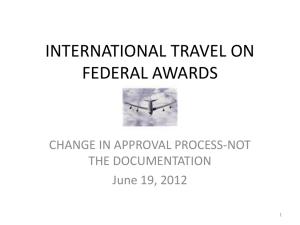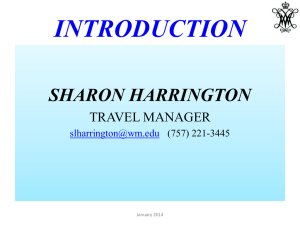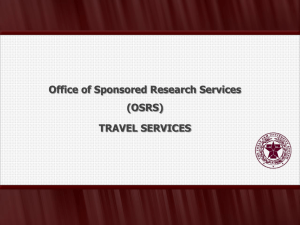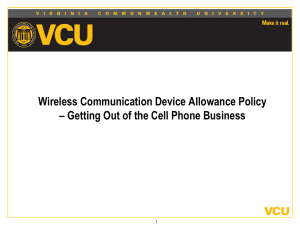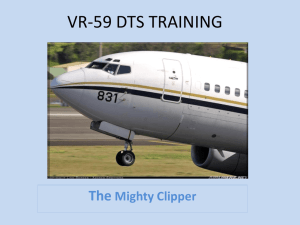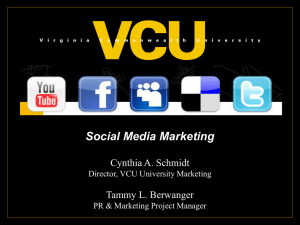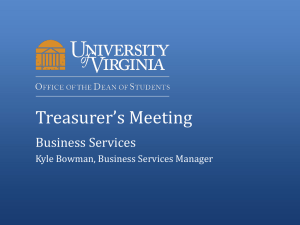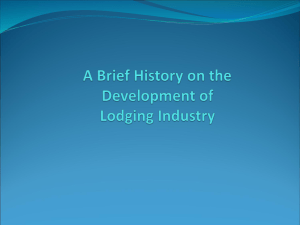Beginner Travel Training
advertisement
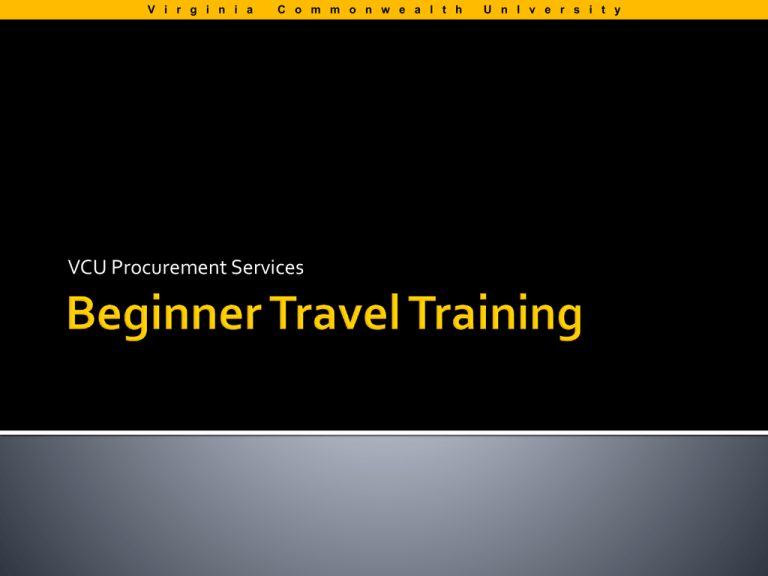
V i r g i n i a C o m m o n w e a l t h VCU Procurement Services U n I v e r s i t y V i r g i n i a C o m m o n w e a l t h U n I v e r s i t y You’ll walk away with an understanding of: Responsibility of approver, department and traveler Overview of Allowable and Non-allowable expenditures per expense category Travel Advance guidelines Documentation required for reimbursement/ receipt management Overview of how to submit expenses for reimbursement through Chrome River Why? So that when you attend hands-on computer training for the Chrome River system, we can dive deep into system functionality V i r g i n i a C o m m o n w e a l t h U n I v e r s i t y Understand Responsibility All reimbursable expenses must: Be reasonable, necessary and appropriately documented Comply with VCU policy and procedures Be approved by the appropriate Authorized Approver Travelers/Travel Planners should seek ways to reduce the cost of travel Expenses for individuals or employees not on official University business are not allowed on state/grant funds State relies on the honesty and integrity of its employees to ensure state funds are used appropriately. VCU assumes no obligation to reimburse employees, students or nonemployees for expenses that are not in compliance with policy. V i r g i n i a C o m m o n w e a l t h U n I v e r s i t y Understand Responsibility –Cont. Authorized Approver At VCU, an Authorized Approver may be an employee’s supervisor or an employee delegated the responsibility by the responsible Dean or VP. While approvals must be made at the levels required by policy, approvals should always move up the chain of command from the payee, not down, to prevent the situation of a subordinate approving a supervisor’s expenses. Must verify expenses meet all of the following criteria: ▪ ▪ ▪ ▪ ▪ Schools/Departments Travel expense was incurred while conducting University business Expenses were necessary and consistent with University polices Information contained on the expense report and in the attached documentation is accurate Expense meets any and all sponsor guidelines, if applicable Expenditures are charged to the proper index(s) and account(s) May, at their discretion, impose greater control than required by VCU travel policy, but never less Ensure anyone traveling on behalf of VCU is aware of and will abide by University policies and procedure Assign a hierarchy of responsibility for preparation and approval of travel expenses Traveler Exercise good judgment when making travel plans Spend the University’s money prudently Comply with the University’s travel policies and procedures V i r g i n i a C o m m o n w e a l t h U n I v e r s i t y Understand Authorization of trip expenses University employees traveling must obtain authorization from their Authorized Approver for any trip in which the total cost is estimated to exceed $500 Authorization for trips should be obtained on the Pre-Approval in Chrome River and should include all costs related to the trip, even expenses paid via P-Card or direct billed on a Purchase Order If authorization was not granted prior to travel, the department has the right to deny any and all such travel related expenses V i r g i n i a C o m m o n w e a l t h U n I v e r s i t y Understand different funding sources State Funds (1XXXXX, 2XXXXX, 5XXXXX and some 3XXXXXs) – Funds from the State Can be used to reimburse allowable expenses per VCU travel policy guidelines Grant Funds Follow the same guidelines as state funds unless otherwise specified in the grant pages Local Funds (4XXXXX, 6XXXXX, 36XXXX-39XXXX ledgers)- Generally unrestricted funds and can be used to charge: Alcohol-related expenses Lodging overages >200% Business meal overages >150% V i r g i n i a C o m m o n w e a l t h U n I v e r s i t y Air Travel Can’t exceed the rates charged for coach fare except: ▪ When it does not cost more than the lowest available coach fare (comparison must be included with the reimbursement documentation) ▪ For travel to Western Europe if the business meeting is conducted within 3 hours of landing ▪ For transoceanic, intercontinental trips involving flight time of at least 8 consecutive hours ▪ If the traveler pays the difference ▪ If the difference is placed on local funds First class airfare is prohibited on state or grant funds regardless of justification For more information on Air Travel, please visit our website: http://procurement.vcu.edu/i-want-to/travel/learn-about-transportationoptions/#air-travel V i r g i n i a C o m m o n w e a l t h U n I v e r s i t y Rail Travel The Authorized Approver may grant permission for above economy class rail travel under any of the following circumstances: ▪ When it does not cost more than the lowest available coach fare (comparison must be attached to the reimbursement documentation) ▪ When reserved coach seats are not offered on route (documentation must be attached) ▪ If the traveler pays the difference ▪ If the difference is placed on Local funds. First class rail fare is prohibited on state or grant funds regardless of justification For more information on Rail Travel, please visit our website: http://procurement.vcu.edu/i-want-to/travel/learn-abouttransportation-options/#rail-travel V i r g i n i a C o m m o n w e a l t h U n I v e r s i t y Personally-Owned Vehicles Employees are permitted to use their personally owned vehicle when it is cost beneficial to the University Commuting mileage is not reimbursable On normal scheduled work days, mileage should be taken from the Employee’s Base Point –place, office or building where the traveler performs duties on a routine basis Mileage may be taken at the current IRS rate of $.565 (for travel taken as of January 1, 2013) Departments may, at their discretion, impose a lower rate for mileage reimbursement V i r g i n i a C o m m o n w e a l t h U n I v e r s i t y Rental Vehicles VASCUPP Contract (Contract # XZ21184) –VCU employee use only ▪ VCU utilizes a non-mandatory VASCUPP contract with Enterprise Leasing Co. to provide nationwide vehicle rentals through Enterprise Rent-A-Car and National Car Rental brands. ▪ This contract may be used for rentals nationally. If using this contract in Northern VA or outside of VA, other rates and fees may apply. ▪ When using this contract, VCU is exempt from paying taxes and fees associated with the rental. It is the traveler’s responsibility to ensure the taxes and fees are appropriately taken off the bill at the time of check out. ▪ If renting from an airport location, airport access fees will be charged and are reimbursable. ▪ To learn more about rental car contract rates, please visit our website: http://procurement.vcu.edu/i-want-to/travel/learn-about-transportationoptions/#vascupp-rental V i r g i n i a C o m m o n w e a l t h U n I v e r s i t y Rental Vehicles –Cont. Insurance ▪ A $5/day Damage Waiver fee is automatically charged and is reflected in the rental car daily rate. Employees should not accept additional insurance. The Department of Treasury, Division of Risk Management, provides a Statewide Self-Insured Automobile plan for State employees. ▪ Non-employees renting a car should only accept LDW (Liability Damage Waiver) and CDW (Collision Damage Waiver) insurance. Additional insurance is not allowed on state or grant funds. ▪ Employees renting a vehicle while traveling internationally (including Puerto Rico and Canada) are required to purchase and will be reimbursed for LDW and CDW insurance. Other types of insurance offered such as trip cancellation, personal, health or life insurance are not reimbursable. V i r g i n i a C o m m o n w e a l t h U n I v e r s i t y Rental Vehicles –Cont. Gas and Extras ▪ Travelers must ensure that the rental vehicle is refueled before returning it to the rental contractor. ▪ Reimbursement will be based on the fuel used and receipts provided. ▪ Fuel purchased from the rental contractor may not be reimbursed with State funds. Employees should never authorize prepayment for fuel as there is potential for purchasing fuel over the amount needed and rental car vendors do not return a credit for unused fuel. ▪ Credit card statements cannot be submitted in lieu of gas receipts unless the detail shows “Automated Fuel Dispenser” ▪ The purchase of additional options, such as XM Radio, car seat, roadside assistance, etc. are not reimbursable. ▪ If renting a vehicle larger than economy or mid-size, a cost justification must be provided. V i r g i n i a C o m m o n w e a l t h U n I v e r s i t y Ground Transportation Public transportation, such as taxis, shuttles and metros, from place of lodging to restaurants is allowed only for official business needs. For taxis, shuttles, parking and tolls, receipts are required for claims in excess of $25.00. Airport Shuttle Services James River Transportation has the current contract with the Richmond Capital Region Airport Commission to provide shuttle services to/from Richmond International Airport (RIC). They have a counter and office located on the first floor of the airport staffed 24/7 to serve customers. Drivers and vehicles are operating at all times. Reservations can be made: ▪ ▪ ▪ on-line (http://jamesrivertrans.com/richmond-airport-shuttle-service/) by phone (804) 249-1052 or through e-mail RIC1@JamesRiverTrans.com To learn more rates and making reservations for guests of the University using this service, please visit our website: http://procurement.vcu.edu/i-want-to/travel/learn-abouttransportation-options/#airport-shuttle V i r g i n i a C o m m o n w e a l t h U n I v e r s i t y Lodging Lodging may be reimbursed when an individual is traveling overnight on official business outside his/her official station – the area within a 25-mile radius of an employee’s base point. Lodging Limits ▪ VCU utilizes lodging limits as set by the U.S. General Services Administration (GSA). These rates are automatically pulled into the Chrome River reimbursement system. ▪ Allowable lodging rate is based on the lodging location ▪ Expenses may be reimbursed up to 200% of the lodging limit with proper written justification (i.e. conference hotel, minimized ground transportation costs, etc.). ▪ If the lodging rate exceeds 200% (2X) of the allowable rate, the overage (including applicable taxes, fees and surcharges) must be charged to a local fund or taken off the reimbursement. ▪ Travelers who do not plan with careful consideration to these guidelines will bear the additional expense personally. In such cases, taxes and surcharges will be prorated accordingly. V i r g i n i a C o m m o n w e a l t h U n I v e r s i t y Lodging –Cont. Alternative Lodging Authorization ▪ When lodging other than hotels and motels is used and the rate charged is over the allowable state rate (e.g. apartments), a comparison must be submitted with the travel submission. The comparison should show: ▪ Total cost for using the alternate lodging accommodations and length of contract ▪ Cost of the usual accommodations ▪ Net savings Non-Canceled Hotel Reservations ▪ Communicate travel plan changes to the hotel as soon as possible when a confirmed reservation is being held. Since hotels can charge for non-cancelled reservation, these charges will not be reimbursed if the traveler is negligent in canceling reservations. V i r g i n i a C o m m o n w e a l t h U n I v e r s i t y Lodging –Cont. Number of Person in an Hotel Room ▪ When 2 or more people are traveling on official University business and staying in the same hotel room, the reimbursable amount will be the lodging rate allowed in the area they are staying, plus the cost charged by the hotel for any additional persons in the room. ▪ Documentation from the hotel listing additional hotel charges for each additional person, per room must be provided. ▪ Dividing the hotel rate by the number of persons in the room for purposes of justifying rates that exceed the lodging guidelines is not permitted for luxury or premium accommodations. Advance Payments ▪ Prepayment for lodging is discouraged. If prepayment is necessary, it is limited to one night’s deposit for payments made on a Purchase Order. ▪ Use of the individual-liability Travel Card is encouraged to secure room confirmations. V i r g i n i a C o m m o n w e a l t h U n I v e r s i t y Meal Per Diem Meals and certain other incidental travel expenses are reimbursable only for overnight official business outside the traveler’s official station M&IE Per Diem ▪ Based on the specific lodging location ▪ GSA rates are used as the standard meal and incidental (M&IE) reimbursement guidelines (including all related taxes and tips) ▪ Receipts are not required ▪ Reimbursement for actual expenses incurred during overnight travel for these expense categories is not permitted above the M&IE per diem ▪ Departments may be more restrictive and reimburse actual expenses up to the appropriate M&IE in place of the maximum per diem ▪ Direct billing of personal meal expenses incurred during overnight travel, including charging meals to direct-billed hotel rooms, is not permitted. Incidental Allowance ▪ $5/day Incidentals included as part of overnight meal per diem cover tips, baggage handling at hotel, housekeeping, personal phone calls, etc. Reimbursement of these expenses as separate items is not permitted. V i r g i n i a C o m m o n w e a l t h U n I v e r s i t y Meal Per Diem –Cont. M&IE Proration and Reductions ▪ Chrome River automatically calculates allowable per diem based on deductions indicated within the Per Diem widget ▪ On a travel departure or return day, 75% of the M&IE rate is reimbursed. For trips involving multiple travel destinations, base the reduction on the per diem in effect for where the night was spent as follows: ▪ Departure Day: Where you spend the night ▪ Return Day: Where you spent the night before returning to home base ▪ When meals are provided at no cost in conjunction with travel events, as part of registration or lodging, the applicable meal amount must be reduced from that day’s allowable per diem. ▪ Choosing not to eat a meal that has been provided due to personal preference does not allow the traveler to claim per diem for that meal unless a justification is provided. V i r g i n i a C o m m o n w e a l t h U n I v e r s i t y International Lodging and Per Diem rates GSA rates are used as the standard lodging and meal incidental reimbursement guidelines. Chrome River automatically pulls these rates from GSA. The M&IE per diem must correspond to the location specified for overnight lodging. Currency Conversion Chrome River allows you to enter in a foreign currency and converts the expense to USD. International lodging and per diem rates can change on a monthly basis. When planning travel, the current rates may be used for estimation purposes, but Chrome River will use rates for the month in which travel was incurred for reimbursement. Credit card statements may be submitted in lieu of currency conversions. Foreign transaction fees shown on the credit card statement are reimbursable. V i r g i n i a C o m m o n w e a l t h U n I v e r s i t y Business Meal- A meal involving more than one person discussing VCU related business Meals involving all employees – charge to Local Funds Meals for Spouse/Friend (i.e. individuals without a direct VCU related business purpose)- charge to Local Funds Define Who, What, When, Where, Why Understand Meal Per Diem Limits The GSA’s CONUS/OCONUS per diem rates are used to determine allowable meal per diem rates. GSA’s Per Diem Breakdown Chart is used to determine the applicable allowable per diem rate for breakfast, lunch and dinner. These rates are automatically loaded in Chrome River. The listed GSA rates are inclusive of all taxes, tips and service fees. Chrome River will base the rate on the city indicated in the tool, which must be the city in which the meal took place. Business meals may be reimbursed up to 150% of the base allowable rate, inclusive of all taxes, tips and service fees. If a business meal exceeds 150% of the applicable meal per diem rate, the overage must be placed on local funds or deducted from the reimbursement in Chrome River. V i r g i n i a C o m m o n w e a l t h U n I v e r s i t y Purchasing Card for Air and Rail tickets only For information on using a P-Card to book air and rail tickets, please visit our website: http://procurement.vcu.edu/i-want-to/use-p-card/use-a-p-card-tobook-air-and-rail-tickets/#.UfwPb9Ksh8E Individual Travel Card Issued to employees who incur significant travel business related expenses as part of their regular job duties. This card is different from the P-Card in that it is individual liability, which means the cardholder will need to pay the bill and seek reimbursement for expense incurred on the card. For more information on Travel Card, please visit our website: http://procurement.vcu.edu/i-wantto/travel/understand-methods-of-payment/#.UfwPfdKsh8F Travel Reimbursement Travelers may pay for travel expenses from their personal funds and get reimbursed for those expenses that were authorized, reasonable and for business purposes only. Purchase Order Can be used to pay for lodging (if authorized by the hotel) and conference registration fees. Payment terms are NET 30 after the travel has taken place. V i r g i n i a C o m m o n w e a l t h U n I v e r s i t y Travel Advances May be issued to University faculty and staff to aid with the purchase of travel related expenses. Travel advances must be requested through Chrome River as an Expense Report. Requests must be at least $100 Must be repaid or reconciled within 45 days from the last date of travel. For more information on how to request a travel advance, please visit our website: http://procurement.vcu.edu/i-want-to/travel/requesta-travel-advance/#.UfwREdKsh8E V i r g i n i a C o m m o n w e a l t h U n I v e r s i t y What type of documentation is required for reimbursement? Business purpose that supports VCU’s mission Itemized receipt or itemized invoice and proof of payment # of people at the business meal/catered event and their affiliation with VCU (i.e. 500 VCU faculty, staff and students) All receipts must be legible. Please keep original receipts on file in your department until the reimbursement has been paid unless your department or grant requires a longer retention period. If a receipt is missing, please call Travel and Reimbursement Services for guidance. Receipts must be electronically uploaded (PDF documents only) to the applicable Expense Report in Chrome River. Originals must not be sent to Procurement Services as the receipts in Chrome River are considered to be original documentation. Departments may impose a more strict receipt retention policy. Departments should follow specific department and grant receipt retention guidelines. V i r g i n i a U n I v e r s i t y After the trip has taken place, gather all of your receipts and begin inputting your expense report in Chrome River The Chrome River reimbursement tool is used to submit: C o m m o n w e a l t h Pre-Approvals Travel Reimbursements Food Reimbursements Personal Reimbursements Please view the 25 minute training video for a mini-training on Chrome River. Just click on the link below and scroll down the page to Help Resources, then click “VCU –Chrome River training video”: http://procurement.vcu.edu/i-want-to/travel/learn-about-vcu- passport/#.UgkTu9Ksh8E V i r g i n i a C o m m o n w e a l t h U n I v e r s i t y For more information on VCU travel policy and procedures and for additional Help Resources related to Chrome River, please visit our website at http://procurement.vcu.edu/ For information regarding Personal Reimbursements, please visit the following link: http://procurement.vcu.edu/i-want-to/pay-anindividual/request-a-personalreimbursement/#.UgkVCNKsh8E

